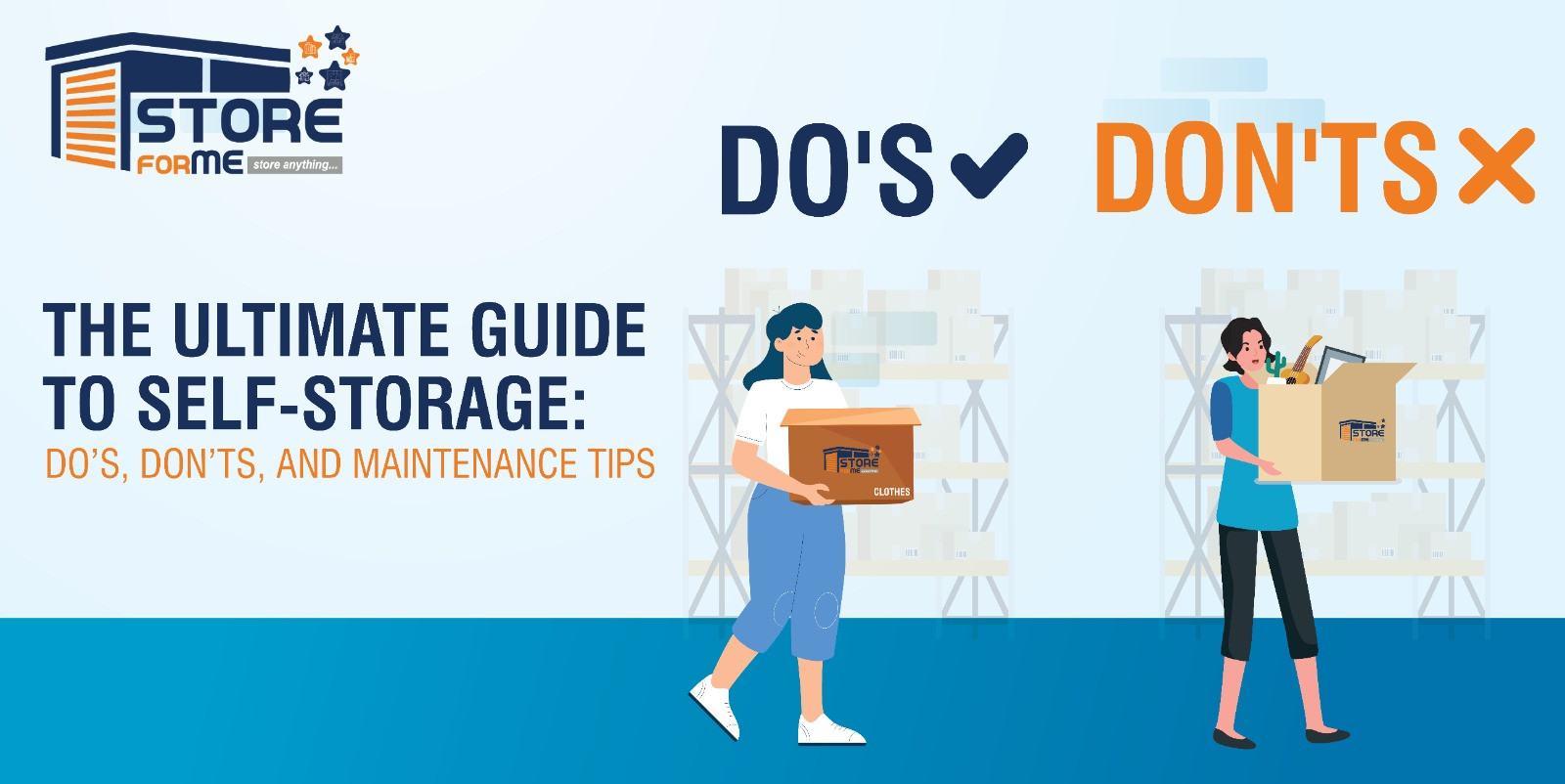The Ultimate Guide to Self-Storage: Do’s, Don’ts, and Maintenance Tips
Introduction: The Importance of Self-Storage for Organization
Keeping your living or working area orderly is essential for productivity and mental calm in our current fast-paced world.Whether you are dealing with personal belongings, seasonal items, or business inventory, self-storage units offer a practical solution. With the help of StoreForMe, you can easily and safely organize your home or place of business, improving its manageability and reducing stress. But in order to get the most out of self-storage, there are a few important rules to remember about what to do and what not to do. The dos and don'ts of self-storage will be covered in this blog, along with upkeep advice for efficient self-storage use.

Do's:
1. Choose the Right Size
Selecting the appropriate unit size is the first step toward an efficient storage experience. Assess the volume and dimensions of the items you plan to store.Select a unit size from the range of sizes available at self-storage facilities to avoid wasting any space. Talking with the staff of the self-storage facility will help you make an informed choice and prevent you from getting a unit that is either too big or too little.Following this self-storage best practice can save you time and money in the long run.
2. Label and Organize Items
Proper organization within your storage unit can save you time and frustration later. Clearly label all boxes and containers with their contents and the room they belong to. Use sturdy shelving units to keep items off the floor and arrange boxes in a logical order, with frequently accessed items near the front. In this manner, finding what you need doesn't require unpacking the entire container. These efficient storage solutions make it easier to locate your belongings when you need them.
3. Secure Valuable Belongings
Even though gated entry and video cameras are common security features at self-storage facilities,it's still advisable to use additional caution when handling valuables. Make sure your storage facility has high-quality locks, and consider additional security measures such as insurance for valuable or expensive items. Store valuable items in sturdy, tamper-proof containers and place them toward the back of the unit for added security. To safeguard your most valuable assets, safe storage techniques are crucial.
4. Regularly Check on Stored Items
Even thoughself-storage units are designed to keep your belongings safe, it's still a good idea to check on your stored items periodically. Frequent visits let you make sure everything is in good condition and look for any indications of damage or pests. By being proactive, you may address potential issues before they become serious ones. Both long-term storage and short-term storage require regular check-ups to ensure the safety of your items.
Don'ts:
1. Don’t Store Perishable Items
Perishable items, such as food and plants, should never be stored in a self-storage unit. These items can attract pests and create unpleasant odours, potentially damaging other stored belongings. Stick to non-perishable items and ensure that all appliances, like refrigerators or freezers, are thoroughly cleaned and dried before storage. Avoiding perishable items storage is a key component of self-storage do's and don'ts.
2. Don’t Overfill the Unit
Avoid the temptation to cram as much as possible into your storage unit. Overfilling might result in broken goods and make it challenging to determine what you actually need. Leave some space for air circulation and movement within the unit. This will help prevent items from becoming crushed or damaged and make it easier to retrieve belongings when needed. Efficient storage solutions include maintaining an organized and not overstuffed unit.
3. Don't Store Hazardous Materials
Significant dangers are associated with hazardous materials, which include flammable liquids, explosives, corrosives, and toxic compounds. Chemical reactions, fires, and other hazardous occurrences can be brought on by them. Find out the exact policies your storage facility has regarding hazardous products by contacting them. Generally speaking, don't store anything that might endanger your health or safety.
4. Don't Use Cheap Packing Materials
Using inferior packaging supplies may cause objects to get damaged. Boxes that are too flimsy may collapse, and inadequate padding can lead to breakage. Make a quality investment in packing supplies like packing peanuts, bubble wrap, and robust boxes. Your belongings will be well-protected during storage if they are packed properly.
Maintenance Tips:
1. Regularly Check Stored Items
Even though self-storage units are designed to keep your belongings safe, it's still a good idea to check on your stored items periodically. Frequent visits let you make sure everything is in good condition and look for any indications of damage or pests. By adopting a proactive attitude, you could address potential issues before they become serious ones. Both long-term storage and short-term storage require regular check-ups to ensure the safety of your items.
2. Keep the Unit Clean and Organized
Preserving your possessions in a storage unit requires keeping it neat and orderly. Sweep the floor regularly and wipe down surfaces to prevent dust and dirt build-up. Reorganize items as needed to ensure that labels remain visible and pathways clear.This procedure protects your possessions while also enhancing the effectiveness and pleasure of your storage experience. Self-storage best practices include keeping your unit tidy and well-organized.
3. Protect Against Pests
Pests can seriously damage the things you've saved. To prevent infestations, avoid storing perishable items and ensure that all containers are sealed tightly. Regularly inspect your unit for signs of pests such as droppings or chewed materials. If you see signs, take quick action to deal with the issue by calling the administration of the storage facility or applying insect repellents.
Conclusion: The Benefits of Following Do’s and Don’ts
Your experience with StoreForMe’s self-storage can be greatly improved by following these dos and don'ts and doing routine maintenance. Keeping your stuff accessible and safe can be achieved by labelling and categorizing goods, selecting the appropriate unit size, and protecting valuables. Avoiding storage of perishable items and overfilling the unit prevent common issues like pest infestations and item damage. Your storage unit will continue to be a trustworthy addition to your house or place of business with routine inspections and cleanings.
You can get the most out of our self-storage facility and maintain your items in top shape while keeping your spaces neat by adhering to these tips. In the end, a well-run self-storage facility offers comfort and supports a more efficient and ordered way of living. Whether you're utilizing storage for personal use or business inventory storage, these self-storage tips will help you achieve the best results. Remember, self-storage do's and don'ts are the foundation of a successful storage experience, ensuring that your items are safe, secure, and easy to access whenever you need them.



